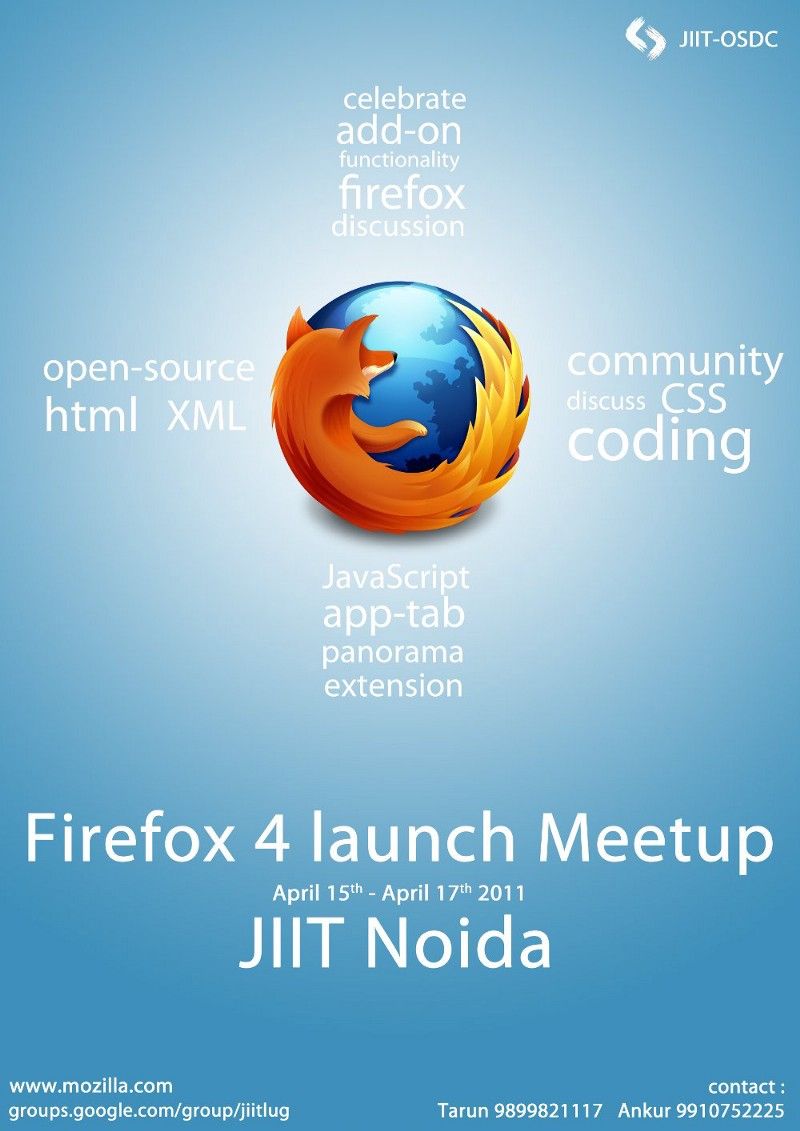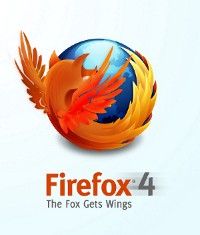Firefox 4 Launch Party!
Note: Post from my old blog.
JIIT OSDC hadn’t organized an event since a very long time. So the members really wanted to do something new. Around this time, Firefox 4 was also launched. So, the members decided to celebrate the launch of Firefox 4 in the college. We were not the only ones doing this. Communities from all over the world were going to have a launch party as Mozilla openly invited anyone to go ahead and celebrate the launch of Firefox 4 in their community or organization. Therefore, our event became an official event of Mozilla. It also became our college’s (JIIT) official event as the Computer Science department was positive about it and was ready to support.

We started preparing for the event by getting a logo designed for the event that never got used somehow, but it looks awesome and lives up to the spirit of Firefox 4. This was followed by designing a poster for the event. We got down to the serious business by discussing what to do and what not to do on our official event page on meetup.com (all the other launch parties were also registered here as Mozilla had asked them to do so). Further discussions continued on for days on the mailing list, IRC channel and during short meetups.
Mozilla expected these events to be just for one day. And, we initially decided that the event will be for two days as we wanted to do a lot of things. But with time, our will to work and do something new only increased and hence we decided to have a three-day long event to produce something amazing out of nowhere. After a lot of discussions, we finalized the contents of the three-day long event. The contents included discussions on the first day of the event, hands-on session on Firefox extension development on the next day and finally coding sprint on ideas proposed by the attendees of the event. Discussions were to happen over new features of Firefox 4, new web technologies like HTML5 and CSS3, Free and Open Source Software (FOSS), etc.
In the meanwhile, we also designed a new logo for OSDC, designed another poster for the event and worked on other important things like setting up the event wiki page, spreading the word, etc. We had decent funds remaining from the sponsorship of our last event, OSSCamp. So we didn’t mind being a little extravagant. Logistics were easily taken care of as the college was supporting us and was ready to provide us with almost everything that we needed. The college gave us a nice classroom for discussions and a computer lab (with wi-fi setup) for two days where we were going to have our hands-on sessions and coding sprint.

The event started with discussions over the new features of Firefox 4. Panorama and Tab Candy were the most liked features. Firefox 4, however, comes with a lot of other cool features that are generally not known to most of the end-users. Mozilla believes that Firefox 4 is the fastest version of Firefox as compared to all the previous versions. And honestly, I have noticed this myself. Firefox 4, on startup, takes a little time. But once it has started, it won’t give you any trouble. There have been major UI changes as well and all of these changes are attractive and useful. The browser window is not overloaded with hundreds of buttons. The status bar is gone. The horizontal menu on the top has been replaced by a menu with only a single button (like Google Chrome). Unlike Google Chrome, you can always get the old horizontal menu if you don’t like the new menu. All this has created a lot of space for web pages. One of the major reasons to this is that Google Toolbar is not required any more. In all the previous versions of Firefox, bookmarks were not synced to any web services so that they can be retrieved anywhere anytime. And Google Toolbar was the most appropriate solution to this. Since Firefox Sync has been released, there is absolutely no need to install Google Toolbar. Firefox Sync saves all your preferences and bookmarks and syncs it with your Firefox account.
So after discussing all these cool features, we started telling the new comers about open source and open source projects, how are they developed, how does the community work, why is open source so good, what can they benefit from it, etc. We further explained the openness and freedom of open source by showing a custom build of Firefox 4 for Intel Atom processor with some modifications (like changed buttons, toolbars, etc.) built by Tavish Naruka. We further discussed HTML5 and CSS3. As the next two days were about developing firefox extensions, I thought it would be a good idea to teach the newbies a little about the technologies required for developing firefox extensions. So, I took a brief session on HTML, XML, CSS and Javascript — the technologies that are used in developing firefox extensions.
The next day was a more involving day. The session was to take place in a computer lab. So it was prepared for the mega geek-up. We began by demonstrating some really cool examples of HTML5 and got down to the real business by starting the hands-on learning session on firefox extension development. I lead the development session and all the other members were helping out students with implementing whatever I was doing on the big screen. We made it a point that everyone should be together and nobody should be lagging behind. That turned out to be very time consuming as we had to make sure that everyone is understanding everything and we knew that many students were not from a technical background. The fact that they had come to attend the event clearly proved that they wanted to learn and contribute and we had to respect that. So we stopped caring about the time and developed our first HelloWorld extension. This activity consumed almost the whole day and it was tiring for most of the people and for the organizers as well. Therefore, we realized that discussing project ideas to work on the next day would be a good idea. This was certainly the most interesting part of the day. We asked everyone present to think of an idea and propose it. As an idea was proposed, other members would give their feedback and suggestions to help everyone evolve the proposed idea. By the end of it, we had 18 unique interesting ideas to work on. This brainstorming session was a lot of fun for everyone. Many of the attendees for the first time understood the power of communities and the way they help in evolving and polishing good ideas.
We had many ambitions for the next day. We had planned to work on most of the project ideas. Therefore, we decided to meetup at 10:00 AM. And we did (on a Sunday morning)! But, there was some major problem with the internet connection in college. So we couldn’t do anything in the college and decided to shift to home of one of Anky’s flat (an existing OSDC member) where we had access to good internet. This whole process of shifting the venue took around 3 hours. So we started working at around 1:00 PM. Now that we had lesser time, we decided to work only on some of the projects out of those 18 ideas that were proposed the day before. Even though all of us were newbies, by 5:00 PM we had achieved major functionality of our project ideas. We were quick because we were working together, helping out each other with difficulties and debugging. We knew that we could have completed at least a couple of projects had everything been in place in the morning. We had to end the event by having a good celebration. After all, that was the whole event was about. Therefore, we halted right there with individual commitments to work on our projects even after the event and complete them and launch them on Mozilla.com. We got beer and food to celebrate. And before the party began, we clicked some crazy photographs!
Did I mention about the swag? I guess not. Mozilla mailed us a package of awesome goodies since we had registered our event with Mozilla. The goodies we received included Firefox badges, stickers, tattoos and sweat bands. They also sent three posters for the three event organizers on meetup.com (the site where all the communities had registered their events with Mozilla).
Currently, three extensions have been submitted to Mozilla and are available for download. They are in the review queue and hence, are not shown in the add-on gallery on mozilla.com for some time. They will be there soon! Furthermore, five more projects are about to reach their completion. This event successfully taught the students Firefox extension development and also pushed a Firefox extension development phase for JIIT OSDC. I also worked on an extension and it is live! Feels really good to contribute!
Links
- JIIT OSDC Official Website
- Event Wiki
- Official Event Page on Meetup.com
- JIIT OSDC Projects Page (for Firefox extensions developed during the meetup)
Originally published at vaidik.in.